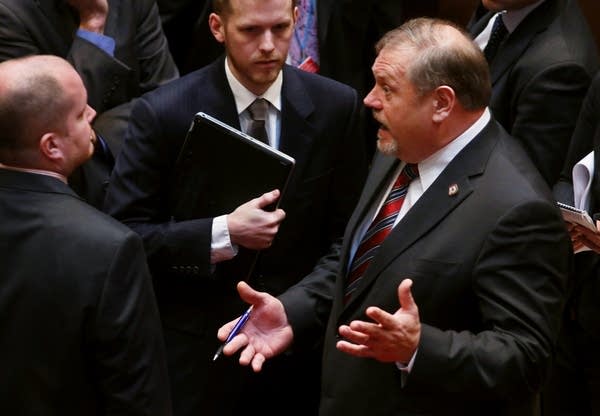Rural lawmakers to press housing, jobs, water issues at Capitol

Rural Minnesota lawmakers hope to use their fall election victories to boost economic development in their districts as the 2015 legislative session gets under way today.
Republicans won 10 DFL-held seats in rural Minnesota in November. That turned out to be the major factor in the GOP taking back control of the House. Now, non-metro organizations and legislators are lining up to make sure their voices get heard at the Capitol.
"All of our initiatives really are economic development focused," said Dan Dorman, a former Republican legislator who now heads the Greater Minnesota Partnership. "We can create jobs, which has a benefit not just to greater Minnesota, but a benefit to the state overall."
Dorman's business advocacy group wants the state to spend more money on job training. Many manufacturers outside the Twin Cities have jobs available but can't find enough workers with the specific skills needed for the job, he said.
Create a More Connected Minnesota
MPR News is your trusted resource for the news you need. With your support, MPR News brings accessible, courageous journalism and authentic conversation to everyone - free of paywalls and barriers. Your gift makes a difference.
Workers also often turn down jobs because they can't find decent places to live, said state Sen. Bill Weber, R-Luverne, who plans to bring attention to the need for rural housing. In southwest Minnesota, meatpacker JBS in Worthington and farm machinery maker AGCO in Jackson have complained about worker housing, he said.
"It's difficult enough to get business and job development" in greater Minnesota and housing shortages are an added battle, he said.
Rural legislators also link economic growth to an easing of environmental and other regulations.
Last year Gov. Mark Dayton signed a bill that reduced processing time for state environmental permits related to job-producing projects. But more needs to be done to eliminate those kinds of barriers, said Rep. Bob Gunther, R-Fairmont.

This year's session should also consider reducing some areas of state control, said Senate Majority Leader Tom Bakk, D-Cook.
Bakk claims that in some areas, including water planning, there are too many layers of bureaucracy for an individual or business to deal with. He represents a mining area in northeast Minnesota and favors expansion of the industry. Water quality is a major issue in the debate over whether the state should approve the new mining operations.
Dorman says he wants a peer review of work done by Minnesota Pollution Control Agency scientists. He also favors subjecting water quality regulations to a cost/benefit analysis.
The agency disagrees with the proposals and says peer review and cost analysis are already part of the water quality process. Last fall, several groups representing cities and farmers sued the MPCA over its new phosphorus reduction rules, arguing that for some the cost of meeting the clean water requirements is too high.
Lawmakers may also confront costs tied to the Lewis & Clark Regional Water System, a long delayed project in southwest Minnesota.
The system is supposed to pipe water from Missouri River aquifers in South Dakota to several Minnesota counties, but cutbacks in federal funding have delayed completion.
Last year Minnesota budgeted about $22 million for the project. Lewis & Clark supporters say they need another $45 million or so to finish building the system in the state. Southwest Minnesota legislators say they'll try to find those dollars in this year's session.